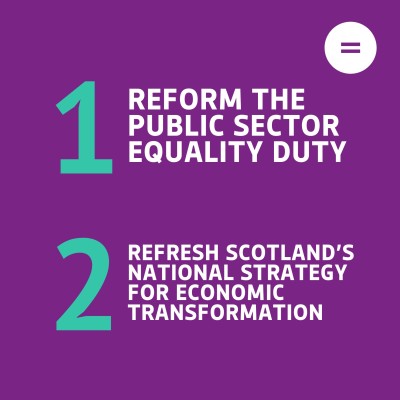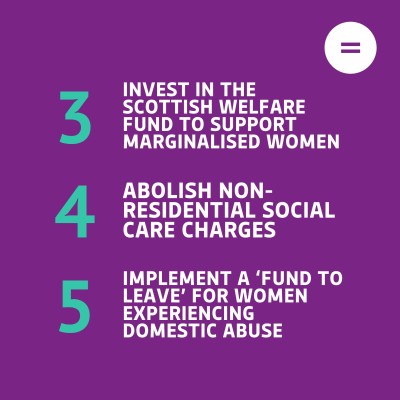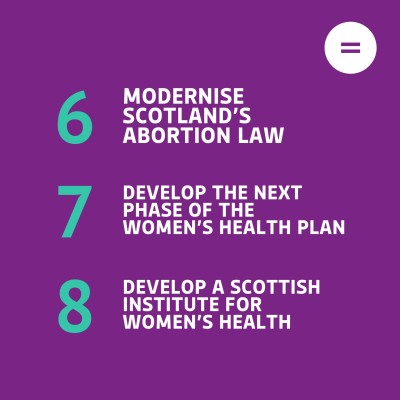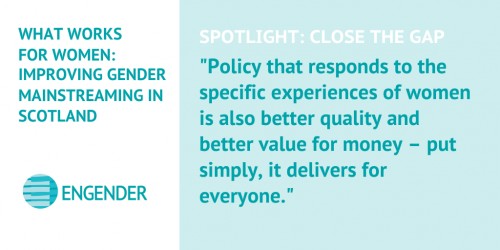Engender blog
8 Steps Towards Women’s Equality in Scotland
Ahead of the next Programme for Government for 2024-25, we have outlined several important actions we want the Scottish Government to take to protect women’s rights and promote gender equality in Scotland.

Engender advocates for a Scotland where women are involved in all political and economic decisions, both as decision-makers and individuals affected by these decisions. This means recognising the diverse experiences of all women, including those facing multiple forms of discrimination, such as Black and minority ethnic women, younger and older women, disabled women, lesbian, bisexual, and trans women, women from rural areas, and those who are mothers, women who have experienced domestic abuse or men’s violence, and those experiencing poverty.
We have identified eight key actions in three main areas that need change:
 EMBED GENDER EQUALITY ACROSS ALL SCOTTISH GOVERNMENT POLICY
EMBED GENDER EQUALITY ACROSS ALL SCOTTISH GOVERNMENT POLICY
To achieve the Scottish Government’s main goals—eliminating child poverty, boosting the economy, addressing climate change, and improving public services—it’s crucial to improve how gender equality is considered across policymaking. These goals affect women and men differently, especially for women facing additional marginalisation. If policies don’t account for structural inequalities, their benefits for Scotland’s most disadvantaged people will be limited.
 ADDRESS WOMEN’S POVERTY AND FINANCIAL INEQUALITY
ADDRESS WOMEN’S POVERTY AND FINANCIAL INEQUALITY
Eliminating child poverty is the First Minister’s top priority. To succeed, the Programme for Government must connect women’s poverty with children’s poverty. There’s an urgent need to get financial support to the most vulnerable families in Scotland, and focusing on women’s economic inequality is often the most effective approach. This must include targeted actions which tackle the disproportionately negative impacts that the cost of living crisis is having on women’s lives, especially for women who experience other forms of marginalisation.
 TACKLE WOMEN’S HEALTH INEQUALITIES AND PROTECT REPRODUCTIVE RIGHTS
TACKLE WOMEN’S HEALTH INEQUALITIES AND PROTECT REPRODUCTIVE RIGHTS
Women and girls still face inequalities in health and wellbeing and access to services compared to men and boys, mainly due to gender inequality and “medical misogyny.” Marginalised women, including women of colour, disabled women, unpaid carers, LGBTI+ women, younger and older women, and migrant women, experience even wider disparities in health outcomes. We urgently need updated abortion laws that uphold women’s rights and action to advance Scotland’s Women’s Health Plan.
Read more about all our asks here.
Scottish charities ‘seriously concerned’ about ‘light-touch’ Scottish Government plans to reform equality rules for public bodies
-400.png)
Today, Engender joined organisations working for equality and human rights in Scotland, including specialist gender ,race and LGBTI equality organisations, in calling for a rethink in Scottish Government plans to change public bodies’ equality obligations.
The Scottish specific duties of the Public Sector Equality Duty, which is meant to ensure that all public bodies take action to proactively advance equality and eliminate discrimination, has been under review for several years. In the joint submission, we state that our concerns about the failures of the existing system are not reflected in the current consultation, despite many of us repeatedly raising these with Scottish Government.
Guest Post: Mainstreaming Spotlight - Close the Gap
To mark the release of Engender's new report, What Works for Women: Improving gender mainstreaming in Scotland, we're sharing how mainstreaming is important to the work of some of Scotland's equalities organisations. Here, Lindsey Millen from Close the Gap talks about how mainstreaming is essential for their work on women's labour market participation.

Why is gender mainstreaming important to your organisation?
Gender mainstreaming is critical to delivering women’s labour market equality and, in doing so, tackle wider gender inequality. Many of the causes of the gender pay gap are not unlawful, e.g. the lack of quality flexible working at senior levels and a lack of affordable wraparound childcare. In order to tackle these issues, gender must be at the heart of policymaking. Policy that responds to the specific experiences of women is also better quality and better value for money – put simply, it delivers for everyone. Gender mainstreaming is such a valuable tool for policymakers and we need to see it being used effectively.
What area(s) of mainstreaming are you focused on?
Close the Gap works on women’s labour market inequality, which includes policy advocacy and employer engagement. The Scottish-specific duties of the public sector equality duty (PSED) are a big focus for us as they require public bodies to mainstream gender across all of their functions. We are interested in how public bodies are using their gender pay gap, occupational segregation and employment data to do gender mainstreaming. This supports our work to advocate for a duty that delivers for women and has formed the basis for our employer guidance on PSED and the work we do to support individual public bodies to improve their compliance.
If you could snap your fingers and change one thing to make gender mainstreaming happen, what would it be?
It is difficult to pick just one thing and there are really three things that have to work in concert in order for gender mainstreaming to happen. Firstly, public bodies need support to develop their understanding of gender inequality and how this relates to the work they do. Without this it’s difficult to develop good quality solutions. Secondly, we need to see real accountability for public bodies to ensure gender mainstreaming is done – and done well. Thirdly, we need leadership at the most senior levels of public bodies that makes clear gender mainstreaming is a core part of their work as public service providers, employers, and in their other roles.
Where can people find out more about your work on mainstreaming?
A good place to start would be our assessments of public bodies’ performance of the duties – here and here. Public sector employers (and PSED geeks) will find our guidance helpful in developing their work on gender mainstreaming and the duties in general – this can be found here. Gender mainstreaming is woven throughout our work – there’s plenty of other content to be found on our website.Women's sector letter to Joan McAlpine MSP
This week the Scottish Parliament held its Stage 1 Debate on the general principles of the Census (Amendment) (Scotland) Bill. Following the debate, Culture, Tourism, Europe and External Affairs Committee convener Joan McAlpine MSP took to Twitter to criticise the work of Engender and other women's organisations. In order to clarify and correct some inaccurate statements which were made, Engender, along with Scottish Women's Aid, Rape Crisis Scotland, Close the Gap, Zero Tolerance and Equate Scotland, wrote to Ms McAlpine and other members of the Committee.
You can read our full letter below.
Downloads
 Engender Briefing: Pension Credit Entitlement Changes
From 15 May 2019, new changes will be introduced which will require couples where one partner has reached state pension age and one has not (‘mixed age couples’) to claim universal credit (UC) instead of Pension Credit.
Engender Briefing: Pension Credit Entitlement Changes
From 15 May 2019, new changes will be introduced which will require couples where one partner has reached state pension age and one has not (‘mixed age couples’) to claim universal credit (UC) instead of Pension Credit.
 Engender Parliamentary Briefing: Condemnation of Misogyny, Racism, Harassment and Sexism
Engender welcomes this Scottish Parliament Debate on Condemnation of Misogyny, Racism, Harassment and Sexism and the opportunity to raise awareness of the ways in which women in Scotland’s inequality contributes to gender-based violence.
Engender Parliamentary Briefing: Condemnation of Misogyny, Racism, Harassment and Sexism
Engender welcomes this Scottish Parliament Debate on Condemnation of Misogyny, Racism, Harassment and Sexism and the opportunity to raise awareness of the ways in which women in Scotland’s inequality contributes to gender-based violence.
 Gender Matters in Social Security: Individual Payments of Universal Credit
A paper calling on the Scottish Government to automatically split payments of Universal Credit between couples, once this power is devolved to the Scottish Parliament.
Gender Matters in Social Security: Individual Payments of Universal Credit
A paper calling on the Scottish Government to automatically split payments of Universal Credit between couples, once this power is devolved to the Scottish Parliament.
 Gender Matters Manifesto: Twenty for 2016
This manifesto sets out measures that, with political will, can be taken over the next parliamentary term in pursuit of these goals.
Gender Matters Manifesto: Twenty for 2016
This manifesto sets out measures that, with political will, can be taken over the next parliamentary term in pursuit of these goals.
 Scottish NGO Briefing for UN Special Rapporteur on Violence Against Women
Joint briefing paper for the UN Rapporteur on Violence Against Women.
Scottish NGO Briefing for UN Special Rapporteur on Violence Against Women
Joint briefing paper for the UN Rapporteur on Violence Against Women.

Newsletter
Sign up to receive our newsletter here:
Sign up to our mailing list
Receive key feminist updates direct to your inbox: